Structure
Once again Apollonius takes advantage of the ring structure to accentuate contrasting portraits of Heracles and Jason.[4] Two
[2] Cf. D. C. Feeney, "Following after Hercules in Virgil and Apollonius," PVS 18 (1986) 62–66 (cf. The Gods in Epic [Oxford 1991] 94–98); J. S. Rusten, Dionysius Scytobrachion (Opladen 1982) 1–18, 65–76.
[3] Lawall 130 observed that Heracles in Colchis would have been an embarrassment to the poet; cf. M. G. Palombi, "Eracle e Ila nelle Argonautiche di Apollonio Rodio," SCO 35 (1985) 85.
[4] For this section, besides Hurst 64–66 and 129–33, cf. also P. Thierstein, Bau der Szenen in den Argonautika des Apollonios Rhodios (Bern 1971)48–57; and A. Köhnken, Apollonios Rhodios und Theokrit. Die Hylas- und die Amykosgeschichten beider Dichter und die Frage der Priorität , Hypomnemata 12 (Gottingen 1965) 17–25.
corresponding sections, one focusing on Heracles (A) and the other on Jason (A ), fall on either side of a brief central scene, in which the poet sets the moment when the Argonauts sail from Mysia, accidentally leaving Heracles, Hylas, and Polyphemus behind (B). In section A, the circumstances that lead up to Heracles' abandonment unfold in two internally balanced subsections. In the first (Aa), during the rowing contest that ensues as a result of the absence of wind, Heracles loses his oar, which breaks while he singlehandedly rows the Argo ; after this, they pull into Mysia late in the day—the time, Apollonius says, when a plowman curses his stomach because of his hunger (a ). Then, Heracles goes off in search of a tree out of which he can make an oar (b ). It is while doing this that he loses Hylas, whom a nymph spies and draws into her pool.[5] A brief digression about how Heracles acquired control of Hylas precedes the poet's account of the rape of the youth: a hungry Heracles took him as his servant after first killing the youth's father over a draft animal that he refused to give him to eat; this, we are told, is the way Heracles initiated a war against the Dryopians (a ). As can be seen from this summary, the plowman Theiodamas attacked by the hungry Heracles in subsection a recalls the simile of the hungry plowman in a , thus enclosing this portion of the episode. As I shall argue below, hunger will prove to be an important element in Heracles' abandonment. In the second half of the first section of the episode (Ab), Apollonius contrasts two reactions to the loss of Hylas—those of Polyphemus (a ) and Heracles (a )—and qualifies each with an animal simile. The bridge between the two portraits is Polyphemus's brief speech informing Heracles of the disappearance of Hylas (b ). Thus, in section A, we see two sides of Heracles: he is the powerful hero who can row the Argo by himself, uproot a tree for his new oar, and conquer the Dryopians (Aa), and he is the frantic lover who loses complete control of himself when his young boyfriend, Hylas, disappears (Ab).
[5] On the parallelism and simultaneity of the actions of Heracles and Hylas, cf. Palombi (supra n. 3) 72.
In the corresponding section of the episode (A ), the structure of which section is an extended ring, Apollonius focuses upon Jason. When dawn reveals that Heracles, together with Polyphemus and Hylas, has been left behind, the second



Before the close of the episode, there is a brief epilogue (C) in which Apollonius repeats and expands upon the fates of Polyphemus, Heracles, and especially Hylas, regarding whom the poet cites the contemporary Cian practice of searching for Heracles' lost boyfriend (a). Following this digression there is a brief passage that serves as a bridge to the first episode of the next book (b), the sojourn among the Bebryces. Accordingly, the structure of the episode appears as follows:
[6] One may well recall that Apollonius set Tiphys and Heracles in the thematic opposition of man of skill and man of strength in his description of the Argo 's departure from the Gulf of Pagasae; see Chapter 5, pp. 92–94.
| ||||||||||||||||||||||||||||||||||||||||||||||||||||||||||||||||||||||||||||||||
A—
The Active Heroism of Heracles in Perspective (1153–1272)
a—
The Loss of Hylas (1153–1239)
Unable to use their sail because of the absence of wind as they leave Cyzicus, the Argonauts decide to have a rowing contest in which the winner will be the last crewman to give up. In the midst of the contest, the men succeed in driving the ship at such a speed that, in the words of the narrator, not even the horses of Poseidon would have overcome it (1157–58). Then, toward late afternoon, one by one they give up until Heracles rows alone and
drives the Argo forward by himself, even causing the timbers of the ship to shake because of his massive strength. Thus Heracles can claim victory in the contest. But just as they are passing the Rhyndacus River and the tomb of Ægæon, the victor's oar breaks in two. With his oar now broken, the hero is reduced to a state of shock because, as the narrator tells us, his hands were unused to inactivity (1170–71).
Apollonius calls attention to the tomb of Ægæon not merely to parade his knowledge of local landmarks but because the tomb bears a thematic relevance to the loss of Heracles' oar and its consequences. The mythic figure Ægæon is not the Hesiodic Uranid here (cf. Th. 147–53, 617–20). According to Lucillus Tarrhæus (apudSad 1.1165c, d [= fr. 11a Linnenkugel]), a first-century-A.D. commentator, Apollonius's Ægæon was the giant who fled from Euboea[*] and died near Phrygia. Tarrhæus draws his information from the Heracleia of Cinæthon (Davies p. 142 a),[7] who tells how Poseidon drowned Ægæon for competing against him.[8] Recognition that this is the Ægæon whose tomb the Argonauts pass is important for the understanding of events in this episode; for Ægæon and Heracles have something in common. Although it may not be immediately apparent, the contest that leads to Heracles' abandonment indirectly involves Poseidon. When the Argonauts get their vessel up to full speed, as mentioned just above, Apollonius states that not even the horses of Poseidon could have caught up with it (1157–58). Even after the rest of the men give up from exhaustion, Heracles continues to row the ship by himself. The authorial comment, in conjunction with the reference to Ægæon's tomb, suggests that the contest has gone too far: the Argonauts—and Heracles in particular—appear to be competing with Poseidon, a very risky challenge. The reader can find confirmation of the fact that the rowing contest has involved the god of the sea in that the Argonauts recognize the absence of Heracles just after they pass the Cape of Poseidon (cf. 1279), a notice that the poet has set at the center of the episode.
[7] Cf. Vian 105 n. 2.
[8] F. Vian, "Les G HG ENEIS de Cyzicus et la Grande Mère des Dieux," RA 72 (1970) 80–96, has discussed the importance of Poseidon and earthborn giants in this area.
There are other indications in the text that Heracles' behavior courts divine disfavor. In his amusing depiction of Heracles after he broke his oar, Apollonius alludes to an Odyssean episode in which Poseidon plays a central role. When Heracles holds on to one half of his oar as the other slips into the sea, he sits and stares in silent disbelief at what has happened to him:

One piece he held
in both his hands as he fell sideways; the sea, carrying away
the other piece , swallowed it in its surf. He sat up , silently
looking around; for his hands were unused to inaction.
The wording recalls the demise of the lesser Ajax in Book 4 of the Odyssey . After Poseidon had saved Ajax from the storm that wrecked so many ships of the Greek fleet, the arrogant boaster insisted that he had saved himself. The enraged god then split the rock on which he sat in two, one piece remaining fixed and the other falling into the sea:[9]
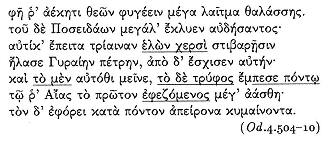
He [sc. Ajax] said that he had escaped the great depth of the sea
in spite of the gods.
Poseidon heard him utter this hybristic boast
and immediately upon taking his trident in his massive hands ,
he struck the Gyræan rock, splitting it in half.
One part remained there, but the other slipped into the sea ,
[9] The parallel was noted by Mooney and Ardizzoni ad 1.1168 and Campbell ad 1.1168–69.
the part on which Ajax was seated when he made his deluded
comment;
this carried him down within the swollen, boundless sea.
By inviting us to think of Ajax's hybristic defiance in Heracles' rowing of the Argo and in the breaking of his oar, Apollonius calls this remarkable feat into question. Comparison with the demise of Oilean Ajax encourages us to view Heracles' rowing as arrogant competition with the god of the sea.
Heracles broke his oar in the early evening (

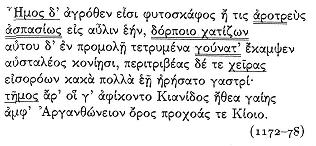
At the time when a gardener or

field toward his hut,

and there at the entrance bends his worn

caked with dust, and looking at his gnarled hands
utters many a curse against his stomach,
at that time the heroes reached the towns of the Cianian land
around Mount Arganthoneion and the mouth of the Cius River.
The simile is a contaminatio of two Homeric similes: Il. 11.86–89 and Od. 13.31–35.[10] In the Iliadic simile, the Greek army breaks through the Trojan line at the time when a weary lumberjack has his lunch:

[10] Cf. Mooney ad 1.1172–77, Vian 105 n. 4, and especially Campbell ad 1.1172ff.

At the time when a lumberjack prepared his dinner
in the mountain glens, after wearing out his hands
cutting tall trees and feeling within that he had had enough,
and

at this time the Danaans courageously broke through the enemy
lines.
In the Odyssean simile, the poet likens Odysseus, who longed for his last day on Phæacia to end, to a tired plowman who desires to go home for dinner:
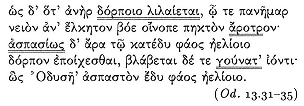
As when a man

a pair of dusky steers pulled his sturdy

land,
and the light of the sun set

so that he can go to prepare his dinner, his

walked,
just so welcome was sunset for Odysseus.
In both Homeric similes, the occupation of the laborer and his sense of hunger, although poignant details, are of secondary importance to the issue of time. Apollonius, however, has heightened the importance of these details by making them equally relevant to the narrative, as will be seen below.[11]
Some have seen the gardener and plowman of the Apollonian simile as representing all the Argonauts, who likewise are weary and hungry from their rowing.[12] On the contrary, the one
[11] Cf. A. W. James, "Some Examples of Imitation in the Similes of Later Greek Epic," Antichthon 3 (1969) 77–90, who argues that in general Apollonius improves on Homer's similes by producing more precise parallels between simile and narrative.
[12] E.g., Blumberg 27 n. 31, Fränkel ad 1.1172–76b.
Argonaut whom the poet highlights in the contest is also the main focus of the simile. In his description of Heracles' rowing, Apollonius says that the hero creates furrows in the water (


While the Argonauts prepare to eat their dinner, Heracles orders them to begin while he goes off to secure another oar. Fränkel has seen in his willingness to put off eating an indication of Heracles' Stoic commitment to duty.[15] Yet Heracles' frenzied response to the loss of Hylas belies such a philosophical stance. Although Apollonius does not make Heracles' feelings about his dinner explicit, the previous simile suggests that Heracles, like the agricultural laborers with whom he is compared, is not altogether pleased with having to work before his meal. In this case, the work will consist of finding and uprooting a small tree out of which to fashion his new oar. One can now better appreciate how thoroughly and successfully Apollonius "contaminated" the two Homeric similes. In the Iliad the hungry worker was a
[13] Pace Collins 88–89, who believes that Heracles was staring at the other Argonauts to prevent their laughing at him.
[15] H. Fränkel, "Das Argonautenepos des Apollonios," MH 14 (1957) 6–7 n. 5; cf. his suggestion in his commentary ad 1.1207–10 that Heracles was a water, as opposed to a wine, drinker because of his Stoic temperance.
lumberjack,[16] and in the Odyssey he was a plowman; in the Argonautica , Heracles digs furrows in the sea and then afterwards uproots a tree on land.
In describing the tree that Heracles plans to use for his oar, Apollonius imitates a line from an episode of the Odyssey in which another club-wielding figure of legend played a central role, the Cyclops Polyphemus. The Argonautic description runs as follows:

Then in his wanderings he [sc. Heracles] found a pine tree, neither
laden
with too many branches nor excessively leafy,
but that was like the stock of a slender poplar;
it appeared equal in length and thickness to the eye .
When Odysseus and his men were inside Polyphemus's cave, they discovered his club, which Odysseus describes to his Phæacian audience in these words:[17]
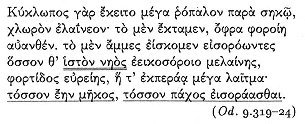
For along the pen lay the Cyclops's great club,
made from the green branch of an olive tree that he had cut to
carry
after it dried out. Upon seeing it we said it looked like
[16] One might recall that in their battle with the Gegeneis, which featured Heracles and his style of heroics, Apollonius compared the felling of the giants to the work of lumberjacks.
[17] Mooney, Ardizzoni, and Campbell ad loc. all note the imitation.
the


a wide freighter, which sails the deep sea;
it was equal in length and thickness to look at .
In addition to imitating Od. 9.324, a few lines later Apollonius also borrows the Odyssean ship simile; but instead of having it qualify the size of the tree (Homer has his simile qualify the size of Polyphemus's club). he applies it to Heracles' uprooting of the tree (



Reference to the Polyphemus episode continues in the third section of this first ring (a ). When we first meet Hylas, he, like Heracles, also goes off to fetch something, in his case water for his master's dinner:

In the meantime Hylas, taking a pitcher of bronze, set off apart
from
the group in search of the holy stream of a fountain, so that he
might
draw water for dinner and have all the other things
ready and in order before Heracles returned.
Before Apollonius, there are only three extant occurrences of the word


He [ sc. Polyphemus] carried a huge bundle
of dried wood so that it might be available to him for his dinner .
He brought it within his cave and threw it down with a crash.

And [the other] half he poured into vessels, so that it might be
at hand
to drink when he wanted and be available to him for his dinner .

He was as hungry as a lion and took in his hand the leg of a lamb,
so that it might be available to him for his dinner when he returned
home.
Imitation of the Homeric

[18] Again, Mooney, Ardizzoni, and Campbell ad loc. cite the Homeric parallels; I found the reference to Matron in TLG .
To sum up what we have seen thus far: in the rowing contest Apollonius implicitly compared Heracles to Ægæon and Ajax, both of whom dared to rival Poseidon, and explicitly to a hungry farmer. In the securing of a new oar and in the preparation for Heracles' dinner, allusion to the cannibalistic Polyphemus, whose cave is filled with all sorts of foods, brings to mind a well-known Homeric figure who is characterized by his excessive hunger and irreverence toward the gods (cf. Od. 9.273–78). All three suffered as a result of their folly: both Ægæon and Ajax were killed at sea for daring to rival Poseidon, and Polyphemus, the son of Poseidon, was blinded by his own club because of his cruelty and appetite. These three figures provide the backdrop against which the story of how Heracles acquired Hylas should be read. They offer eloquent comment on why Heracles loses him.
Apollonius explains the speed and care of Hylas's preparations for Heracles' dinner in a brief digression. Heracles had trained the youth well in his duties ever since the time he had taken him from his father, Theiodamas, whom the hero killed over a draft ox.[19] The narrator informs us, however, that this was merely a pretext for initiating a war against the unjust Dryopians (1207–20). Apollonius's sketchy telling of the tale conflicts in several points with that of Callimachus, who many agree was Apollonius's model.[20] In the Ætia fr. (fr. 22–25 Pf.), Callimachus combined two stories involving Heracles

[19] J. Cowell, "Hylas and Heracles," Pegasus 12 (1969) 44–48, argues that elements of Hylas's experience associate him with the ephebeia. Hunter (2) 448–52 makes a similar argument regarding Jason.
[20] E.g., A. Ardizzoni, "Eracle e Teodamante in Callimaco e in Apollonio Rodio," RFIC 13 (1935) 452–67; C. Corbato, Riprese callimachee in Apollonio Rodio (Trieste 1955) 7–12; and more recently, A. Barigazzi, "Eracle e Tiodamante [sic ] in Callimaco e Apollonio Rodio," Prometheus 2 (1976) 227–38.
[21] This is also the version of Conon Dieg. 11 (FGrHist 26 F 1.11), Philostratus Im. 2.24, Lactantius Div. Inst. 1.21, among others; in Apollodorus 2.5.11, the ox pulls a cart, not a plow.
stories, the victim of Heracles'





[22] Vian 46–48; in particular, Vian compares Ætia fr. 22 Pf. with Argo. 1214; cf. Feeney (supra n. 2) 56.
[24] A comparable identification of victor and vanquished was observed in the previous chapter; cf. Chapter 7, pp. 173–74.
Heracles, this will be the painful loss of the son of the man he piteously killed.
In describing the rape of Heracles' young page, Apollonius focuses on the numinous setting and, within it, the reaction of the water nymph to Hylas's beauty. In doing so, he imitates certain features of the episode in the Odyssey in which Nausicaa fell in love with Odysseus.
When Hylas approaches the fountain into which he will eventually be drawn, the nymphs of the area are dancing in honor of Artemis:
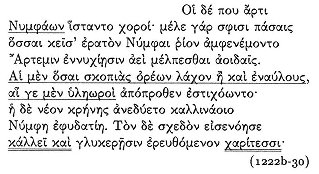
Just then choruses
of nymphs were beginning to form; for it was the duty of all
the nymphs who lived thereabout on the lovely mountain
to celebrate Artemis forever with nightly songs.
Those whose allotted homes were the peaks of mountains or
the streams
and those living in the forest were arranging themselves in lines
far away.
But the nymph of the fair-flowing fountain just then rose up
to the surface of the water and saw Hylas nearby,
a flush of

Apollonius has in mind the moment when Odysseus, after his exhausting swim to Phæacia, is roused from sleep by the voices of Nausicaa, who has just been compared to Artemis (Od. 6.102–9; cf. 149–52), and her servants:[25]
[25] Mooney ad 1.1226 and Vian 108 n. 3 observed the imitation.
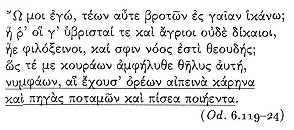
Alas! Who are the people to whose land I have come?
Are they arrogant, savage, unjust?
Or do they welcome strangers and fear the gods?
The sound of girl's voices has reached me,
like those of nymphs who inhabit the lofty peaks of mountains,
and the river springs , and the grassy dells .
Apollonius has adapted the Odyssean division of nymphs into groups of three. He then describes the effect that Hylas has on the nymph in a way that recalls the effect that Odysseus had on Nausicaa after his bath:[26]

Then, going apart, he sat down upon the seashore
glistening with

in amazement.
In his reference to this famous episode, the poet would seem to urge the reader to compare Hylas and the nymph to Odysseus and Nausicaa, and upon comparison we observe a significant inversion of the Homeric model: the young and effeminate[27] Hylas is cast in
Odysseus's role, and the aggressive nymph is placed in that of the demure Nausicaa.
Hylas is a passive young man who, when fetching water, causes a young nymph to fall desperately in love with him; he is also the antithesis both of the Homeric hero, with whom he is subtly compared, and his master, who has just rowed the Argo by himself and uprooted a tall tree. In the second half of this episode (A ), Apollonius will turn his attention to Jason, another young man who, like Hylas, causes young women to fall desperately in love with him as he searches for the golden fleece. Like Hylas, Jason too stands in strong contrast with Heracles by virtue of his passive mode of action. But as will be seen in the second half of the episode, Jason's passivity and skills of leadership prove effective and, what is more, essential for an expedition without Heracles. One other point of comparison between Jason and Hylas emerges: like Hylas, the passive Jason will have a captivating effect on Medea, the key to the success of the expedition;[28] and like the nymph, Medea will not let go.
b—
Reaction to the Loss of Hylas (1240–72)
As I pointed out in the previous chapter, Apollonius has a remarkable talent for forging elements from diverse and even contradictory traditions into a unified and convincing story line. Here too in his account of the loss of Hylas, the poet has successfully blended several divergent accounts,[29] aided, perhaps even influenced, by his predilection for the ring format. According to Autocharis (FGrHist 249 F 1), who provides us with the earliest extant tradition of the events in Mysia, Polyphemus the Argonaut founded the city of Cius,[30] and Hylas was a local divinity. Later
[28] Apollonius will refer to the Odyssean episode just alluded to in the third book when Medea goes to meet Jason for the first time, imitating both the tripartite division of nymphs and the simile comparing Nausicaa to Artemis (Argo. 3.876–84). Before leaving this section of the episode, I would also add that just as Heracles reveals the enormous capacity of his physical strength by single-handedly plowing the sea (i.e., rowing the Argo by himself), Jason's great heroic feat in the poem similarly entails the single-handed plowing of the field of Ares with brazen, fire-breathing bulls (3.1326ff.); the ability to succeed in the latter task, however, comes not from Jason's own physical power, but from the drugs given him by the young woman whom he seduced.
[29] For more details, see Delage 115, Händel 27–33, Vian 43–48.
[30] A fact that Apollonius will mention; cf. 1321–33, 1345–47.
versions (e.g., Euphorion fr. 76 Powell, Socrates

In addition to incorporating a reference to the tradition in which Polyphemus was Hylas's lover, the ring format also invites a comparison between the reactions of the two heroes to the loss of Hylas; and just as he contrasted the different roles that Heracles and Jason played in the battles on Oros Arkton, here too Apollonius highlights the different reactions to Hylas's disappearance through animal similes. In this way, the poet uses Hylas's other lover as a foil for Heracles, who is clearly the main focal point of the first half of the episode.[32] While Polyphemus awaits Heracles' return,[33] he hears Hylas's shout and runs to the fountain like a wild and hungry animal (

[31] Cf. The Oxyrhynchus Papyri 54 (1987) no. 3727 for the fragment of a second-century-B.C. poem that also makes Heracles the lover of Hylas; and G. L. Huxley, "Thracian Hylas," JHS 109 (1989) 185–86, for a brief discussion of this fragment. The relationship between Heracles and Hylas is not the equivalent of a father–son relationship (as D. N. Levin, "Apollonius' Heracles," CJ 67 [1971] 24–25, and M. Pulbrook, "The Hylas Myth in Apollonius of Rhodes and Theocritus," Maynooth Review 8 [1983] 25–31, cited by F. McGready, "Heracles' Love for Hylas," CL 3 [1983] 79–80). Heracles' reaction to Hylas's loss betrays clear signs that the hero was in love with the boy; see H. White, Studies in Theocritus and Other Hellenistic Poets (Amsterdam 1979) 63–73.
[32] Cf. Levin (supra n. 31) 25, Palombi (supra n. 3) 84.
[33] This is an especially nice touch; Polyphemus, as Blumberg 25 reminds us, is Heracles' brother-in-law, and so his concern is dramatically plausible.
hunger motif seen above; because of his "hunger" to find Hylas he, like Heracles, will be left behind.[34] The manner in which he responds to the emergency, however, differs significantly from Heracles'. In his frantic search for the boy, Polyphemus at least has a plan of action and gives some thought to what might have happened to Hylas. His constant shouts are meant to get a response from the boy; he believes that Hylas may be the prey of an animal or of some pirates, and for this reason draws his sword (ba , 1240–52). He is not, then, completely undone by the situation.
Heracles' response to the news is quite different. At the center of this ring, Polyphemus meets Heracles, informs him about Hylas, and offers his erroneous opinion about what has happened. In the following section, which corresponds to that giving the reaction of Polyphemus (ba , 1261–72),[35] Heracles does not act so logically. He begins to sweat and experience nausea, and then bolts off with no particular place in mind. Apollonius compares him to a bull stung by a gadfly who now runs and now stops to howl out of pain.[36] Like the bull, Heracles runs helter-skelter and every now and then stops to shout—not because he is calling out to locate Hylas, but because of the pain that the boy's loss has caused. Moreover, he describes the bull as



[34] Cf. Fränkel ad 1.1245. The association of Polyphemus with Heracles' fate calls to mind the other Polyphemus, the Cyclops, whose hunger prompted his suffering, to which Odyssean episode Apollonius alluded in this section of the episode.
[35] N.B. there is also a close numerical corresponsion between the parts of this subsection: 13 lines–8 lines–12 lines.
[36] James (supra n. 11) 84 discusses the relationship of this simile to its Homeric model, Od. 22.299ff.
two and points to the ironic justice of Heracles' predicament. In short, Apollonius has Heracles reenact the occupation and suffering of the man he victimized. Comparison with Polyphemus the Argonaut underscores Heracles' complete inability to deal with the situation. Like Jason in the ensuing conflict arising over his abandonment, Heracles can well be described as

B—
Heracles Abandoned (1273–79)
Seven lines (1273–79) act as a bridge to the second half of the episode and contain an important detail that enhances our understanding of why Heracles is abandoned. While Polyphemus and Heracles search for Hylas, Tiphys gives the order to board the ship to take advantage of the winds. It is still dark, and for this reason the Argonauts do not notice that the three are missing. Since the men avail themselves of the winds, they would not have been at their oars, where the absence of the three would have been observed.[37] They remain unaware of the accidental abandonment of their comrades until they pass Cape Poseidon, after which dawn reveals the absence of the three men. Reference to the god's name, given the sequence of events, is significant. As I argued above, in the rowing contest Heracles is subtly associated with Ægæon and Ajax, both of whom vie with the god of the sea. By rowing the Argo at a speed said to be faster than the steeds of Poseidon, the Argonauts, and Heracles in particular, can be viewed as competing with the god. Thus, reference to Poseidon the moment the Argonauts come to see that they have left behind Heracles, Hylas, and Polyphemus admirably brings the first half of the episode to a close by hinting at the reason why Heracles is abandoned: like his mythological and literary analogues, Heracles is so confident in his strength that he can, and is willing to, act on his own. As Jason observed, the expedition to and from Colchis is a common concern. Heracles' godlike strength and self-sufficiency are completely inappropriate for a group of highly talented, but interdependent, heroes engaged in a
[37] So Blumberg 28.
nautical

Heracles' hybris, moreover, is of a piece with his behavior toward Theiodamas and his people. Apollonius tells us that Heracles took it upon himself to concoct a grim pretext (

[38] Cf. G. Karl Galinsky, The Herakles Theme (Oxford 1972) 109, who states: "But before Herakles can row the boat out of contemporary reality, the oar snaps in the middle, and primitive heroic will and strength are defeated."
[39] Apollonius also introduces into his literary collage a detail that makes reference to another story involving the Dryopians. Heracles was believed to have fought with the Dryopians while staying at the home of Ceyx, king of Trachis (cf. Apollodorus 2.7). According to Hesiod's Ceykos Gamos (fr. 263 M&W), this event would have occurred just after Heracles was abandoned at Aphetae. By having Heracles require the Cians to send hostages to Trachis, thus ensuring their continuation of the search (1354–57), and by telling the story of the Dryopians in the context of Heracles' abandonment, Apollonius would seem to have the Hesiodic poem in mind. Although this poem is too fragmentary to afford us any clear insight into what Apollonius might have had in mind, if anything, through such a subtle reference, nonetheless I find it significant that in the Hesiodic poem Heracles had an eating contest with a certain Lepreus, whom he went on to kill ob indignationem æmulæ virtutis (cf. fr. 265 M&W).
[40] I wonder if it might also be significant that Heracles is compared to a bull, given the fact that he ate Theiodamas's steer.
[41] Many have viewed Heracles' behavior here and elsewhere in the poem in a favorable light, arguing that he was a Stoic saint, human benefactor, or the great hero of grand epic (cf. Chapter 6, pp. 139–40): e.g., A. Ardizzoni, L'Eracle "semnós" nel poema di Apollonio (Catania 1937); Fränkel ad 1.855ff., 1187–89, 1207–10; Palombi (supra n. 3) 83; and Barigazzi (supra n. 20) 232and 236–37. Others have questioned the seriousness of this character in their analysis of the text (e.g., Lawall 2 argues that Heracles is too large for reality and is without any sensitivity; and Collins 86ff., that Heracles lacks dignity and wisdom; cf. Levin [supra n. 31] 25, who tries to steer a middle course between the august and the brutish Heracles); but where a subtext exists, it should be taken into consideration, especially with regard to interpretations of the central characters of the poem. In this episode, the Homeric models used in his portrayal of Heracles are blasphemous brutes.
in sharp contrast to Jason's more conciliatory mode of behavior. The latter is the focus of the second half of the episode.
A—
The Passive Heroism of Jason in Perspective (1280–1344)
Scholarly interest in the Argonautic sojourn in Mysia has focused, by and large, on the story of Heracles and Hylas, and especially on how it compares with the Theocritean version of the tale. Few critics have observed how Apollonius successfully integrated this etiological story within its larger context, appreciation of which does not depend on knowledge of the relative dating of the two third-century versions.[42] As becomes readily apparent once one perceives the balanced structure of the episode, Heracles' reaction to the loss of Hylas stands in sharp contrast to Jason's response to the loss of Heracles. In this way, Apollonius has brought the story of Hylas fully within the larger framework of his thematic contrast between the man of strength and the man of skill, and in particular between Heracles and Jason.
When the Argonauts notice that their three comrades are missing, a



[42] I have not myself been able to decide whether Theocritus or Apollonius is the imitator in this case, and so leave this issue aside in the present discussion. In any event, even if Apollonius were imitating Theocritus, as Köhnken argues (supra n. 4; cf. Vian 48), my interpretation of this episode would not change substantially.
Among them a violent disagreement ensued, an unspeakable
argument as to whether they left behind the best of their comrades
when they set off.
The question behind the dispute is worded ambiguously. Although the

There is no doubt that Heracles is the strongest of the Argonauts. Apollonius has just given us a vivid portrayal of his enormous strength in the rowing contest. Elsewhere in the poem there are not only clear indications of what his contemporaries thought of him,[44] but also unambiguous indications that he could have performed the expedition by himself.[45] Strength, however, is not the sole factor to be considered in determining the nature or identity of the best of the Argonauts. At Pagasae, Jason described the best man as the one who concerns himself with all the details, especially those involving treaties (




When the Argonauts realize that Heracles is no longer among them, Jason at first finds himself at a complete loss and neither does nor says anything:[46]
[43] Cf. Giangrande 14–15.
[44] Besides the election, where the Argonauts immediately judge him the best among them (1.341–43), cf. 2.145–50, 774–95; the narrator makes it clear that Heracles is the strongest among the group twice, at 1.197 and 3.1232–34.
[45] See above, pp. 176–77.
[46] Hurst 66 has aptly observed that his silent aporia corresponds to that of Heracles at the beginning of the episode, when he too sat in silent disbelief at the breaking of his oar.

Stunned and helpless,
the son of Æson spoke not a word either this way
or that, but sat, eating his heart out
because of this grievous misfortune.
Telamon reacts to the loss of his friend just as Heracles reacted to the loss of Hylas: immediately and without any reflection. Like Idas at Pagasae, he misinterprets Jason's silence and, as a result, becomes furious, believing that Jason had schemed to abandon Heracles (1290–93). The suspicion that Telamon entertains—that Jason wanted to get rid of the one whose glorious achievements would far outshine his own—is erroneous. But it is not implausible, especially given the issue of

At the conclusion of his brief speech, Telamon states that he will return to Mysia to find Heracles. His words recall a climactic moment in the Iliad , when Achilles realizes that although he
[47] Cf. J. Schmidt, "Telamon," Roscher 5.219–23; N.B. at Idyll 13.38 Theocritus has Hylas fetch water for Heracles and Telamon who share the same table; and Valerius Flaccus Argo. 1.353–54 has them share the same bench. U. von Wilamowitz-Moellendorf, Die Textgeschichte der griechischen Bukoliker (Berlin 1906) 178, argues for Theocritean imitation on this point; cf. Serrao (supra n. 27) 560–61.
[48] Cf. Blumberg 28.
has everything that Zeus promised, he has lost his dear comrade Patroclus:[49]

But what profit is there in words? For I shall go even despite your
comrades who have fabricated this plot together with you.

Mother of mine, the Olympian god has fulfilled my wishes.
But what profit is there in this, since my dear comrade has died,
Patroclus, whom I honored above all comrades,
even as I do myself.
The contrast between the Argonautic passage and its model is striking. In the Homeric context, Achilles, enraged by the death of Patroclus, which took away any enjoyment he might have had of the fulfillment of Zeus's promises, chose to rejoin his compatriots and do battle with Hector, which he knew would lead to his own death. On the other hand, Telamon is about to abandon the expedition after jumping to a mistaken conclusion about the abandonment of his companion, who, at the time the Argonauts disembarked, was engaged in the futile and frantic search for his boyfriend. The imitation invests Telamon's angry reaction with epic coloration; but as we already know and the poet will have Glaucus reveal, the reasons for his anger are unsubstantiated; his Achillean wrath is empty.[50]
[50] Hunter (2) 444 suggests that this first stage of the argument between Jason and Telamon has as its model the quarrel between Achilles and Agamemnon in Iliad 1. There are, however, no discernible textual points of contact, although it is true, as he and others have pointed out, that the resolution of the Argonautic argument looks to that of the Iliadic; see immediately below.
After blaming Jason for the abandonment of Heracles, Telamon turns against Tiphys, who ordered the sailing, and would have succeeded in having the ship return to Mysia, despite the opposition of the wind and the current, had the Boreads not prevented this through their harsh words (1300–1301). The narrator then digresses and informs us of their fate: years later they will pay for their intervention when Heracles kills them after the funeral games in honor of Pelias, and, as a memorial of this, one of their funeral markers will sway to the blasts of their father, Boreas. Although the Argonauts are now proceeding ahead as they should, nonetheless a problem remains: they still harbor the bad feelings and suspicions that the abandonment of Heracles evoked. What is needed is a remedy for the mistrust elicited by the

To return briefly to the structure of this section of the episode, the outbreak of the


Apollonius did not invent the involvement of this minor sea divinity in the Argonautic legend. According to Philostratus (Imag. 2.15) and Diodorus (4.48), there was a tradition that Glaucus appeared to the Argonauts in the Black Sea, where he gave them prophecies. Diodorus even has him predict for Heracles the completion of his labors and his future immortality. According to Possis of Magnesia (FGrHist 480 F 2), Glaucus built the
Argo and was its helmsman in a battle against the Tyrrhenians. Afterwards, in accordance with Zeus's wishes, he disappeared into the depths of the sea (




[51] As U. von Wilamowitz-Moellendorff, Hellenistische Dichtung in der Zeit des Kallimachos (reprint: Dublin 1973) 2.222 n. 1, avers.
thus allows both heroes to pursue their goals in the ways that best suit their personalities and abilities.
After Heracles' abandonment is discovered, Jason is stricken with





[53] Cf. M. G. Palombi, "Apollonio e il dodecathlon," Prometheus 11 (1985) 131–33.
power is so massive, one never doubts his ability to succeed. That a young man of the people (


The cosmopolitan and sophisticated audience of Apollonius's day, like the heroes of the Argonautica , must also have left behind their belief in the great Heraclean hero. The figure of a Heracles was doubtless as unreal to them as Lynceus's sighting of Heracles in the Libyan desert (4.1477–80). In an age so absorbed with realism,[54] the real-life hero does not single-handedly row ships, but rather must know how to navigate seas of conflicting interests, foreign and internal squabbles, and the many obstacles—foreign customs, places, and peoples—that beset his quest for success. It is no longer the age of the old hero who could throw a huge boulder by himself. The epic magnitude of the challenge has not changed. But when the performer of a great

Who, then, is the best of the Argonauts? Apollonius colors the reader's response to this question, which is implicit in the

In his apology to Jason, Telamon excuses his importunate words and asks Jason to cast his atrocious behavior to the winds:
[54] G. Zanker, Realism in Alexandrian Poetry: A Literature and Its Audience (London 1987), provides an excellent study of this feature of Hellenistic thought; on realism in Apollonius in particular, cf. M. Lombardi, "Aspetti del realismo nelle Argonautiche di Apollonio Rodio," Orpheus 6 (1985) 250–69. Realism was a hallmark of Hellenistic art in general; cf. T. B. L. Webster, Hellenistic Poetry and Art (London 1964); J. J. Pollitt, Art in the Hellenistic Age (Cambridge 1986); and even more recently B. H. Fowler, The Hellenistic Æsthetic (Madison 1989).
[55] Cf. 3.1365–67, where Apollonius uses this Homeric trope when Jason throws the stone that causes the earth-born men sprung from the dragon's teeth to fight among themselves (see Hunter ad loc. ).

Son of Æson, do not be angry with me if in my ignorance
I acted foolishly . Excessive grief led me to make
so arrogant and intolerable a speech.


before.
In the Homeric corpus, the form


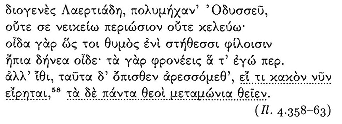
Zeus-born son of Laërtes, clever Odysseus,
I have no intention of rebuking you excessively or ordering you
about,
for I know that the feelings you hold within
are well-meaning, since you think along the same lines as I.
[56] Cf. Ardizzoni ad 1333; N.B. in the last two instances the word is in the same metrical sedes as in the Argonautic passage.
[57] Mooney ad 1.1330 noted the parallel.
[58]But, come now, let's settle these things later



Like Agamemnon, Telamon has incorrectly interpreted his comrade's inactivity and has spoken out of line; and like Agamemnon, he asks that his impertinent statement be rendered null and void.
Campbell has pointed out another parallel to Telamon's apology that merits close attention.[59] During Odysseus's brief stay on Phæacia, Euryalus insulted his anonymous guest for refusing to take part in the athletic contests:
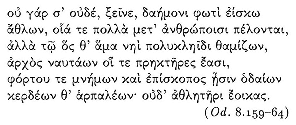
Stranger, I do not make you out to be a man skilled in the many
athletic contests that there are in the world,
but one who travels about in a many-oared ship,
a captain of sailors who are in the business of trading merchandise;
a man who thinks only of his freight and watches out for his cargo
and eagerly sought gain. But you do not look like one who cares
for

As in the Iliadic passage discussed immediately above, Odysseus's hesitation to act—in the Odyssean context, to compete—is misinterpreted. After he defeated all the athletes in the discus contest, it became clear to all the Phæacians that Odysseus did not hesitate out of inability or cowardice; and Euryalus apologizes for his foolish remark:

[59] Campbell ad 1.1332ff.
Hail, honored stranger.


May the gods grant that you see your wife and arrive in your
fatherland, since you have suffered for a long time far away from
your loved ones.
It would seem that Apollonius also had the phrasing of Euryalus's apology in mind in his articulation of Telamon's. In addition to the similar phraseology, this Odyssean dispute in general parallels the Argonautic argument: Euryalus makes the mistaken judgment that Odysseus does not know how to succeed in




Faced with the possible abandonment of the expedition, Jason, as we have seen, is at first incapable of action, and his temporary paralysis leads immediately to chaos and disorder. Yet, as I stated above, even after the Boreads get the Argonauts on the proper course and Glaucus clears Jason of Telamon's charge, the crisis is not yet completely resolved. Jason must find some way to restore unity and resume command of his expedition. Telamon offers that opportunity in his apology, which Jason accepts graciously, even putting Telamon in his debt:


But I shall not harbor bitter wrath against you,
despite my earlier distress,



even fight
another on my behalf, should such a situation ever arise.
The heart of Jason's acceptance is modeled on a comment that the Homeric narrator made as Achilles pursued Hector around the walls of Troy:[60]

The two ran along, the one fleeing and the one behind in pursuit.
A noble man fled in front, but a much better man held him in hot
pursuit,



Like the narrator of the Iliad , Jason stands apart as an observer of the action, and in this he differs markedly from the other Argonauts. This aloofness from action comes across at first as unheroic passivity; yet it enables him to achieve a better perspective on the relative importance of this and other events. As wrong as Telamon was, Jason acknowledges that his concerns were at least not ignoble. In a masterful stroke of diplomacy he dismisses Telamon's insulting accusation and suggests that one day Telamon might even fight as valiantly on his behalf; these are the kinds of pacts
[60] Observed by Mooney ad 1.1330, Campbell ad 1.1339–42, Vian 113 n. 4; cf. R. W. Garson, "Homeric Echoes in Apollonius Rhodius' Argonautica ," CP 67 (1972) 6.
the Jasonian hero makes best, as his dealings with Medea will demonstrate.
The crisis following the abandonment of Heracles is also enlightening on another related issue. Jason may be skilled in taking care of the details of the expedition and in settling arguments, but, as is quite evident here, he does not create the opportunities for his diplomatic successes. Rather, his passive style requires that he depend on forces and occurrences outside his making; he waits for opportunities that he can turn to the benefit of the group.[61] This approach differs from the active style of a Heracles and a Telamon, which locks them into a perversely egotistic and divisive course of action. Rather, for Jason the goal of the whole group takes precedence over the personal pique of the one:


THROUGHOUT the rest of the poem Jason will maintain this passive style. He does not make things happen but waits for the dust to settle before taking advantage of the opportunities that others—mortal and divine—have provided. Jason's talents include the ability to attract women, to take care of the quotidian details of running an expedition, and to make the best of bad situations through skillful crisis management. These are not the qualities one normally associates with the best of the Greek heroes. In the Iliadic Catalogue of Ships, which Apollonius's Catalogue pointedly calls to mind, Homer asked who the best of the Achæans was, and gave as his answer Telamonian Ajax—that is, as long as Achilles was absent. Likewise, on several occasions in Book 1 Apollonius poses the question, Who is the best of the Argonauts? At the conclusion of this book the reader has an answer. In the
[62] On the importance of unity as a theme in the poem, cf. Vian 48–49, Hunter (2) 445, and "Apollo and the Argonauts: Two Notes on Ap. Rhod. 2.669–719," MH 43 (1986) 50–54.
absence of Heracles—or in the absence of some one like Heracles; that is, in the absence of a totally self-sufficient man of godlike strength—Jason, a totally dependent man of limited skills, proves to be the best of the Argonauts.
At the conclusion of Book 1, we have seen the old Homeric hero redefined. Jason has emerged as a new, Alexandrian epic hero, the best among his peers at completing heroic




[63] Fraser's generally negative view of the Argonautica (Ptolemaic Alexandria [Oxford 1972] 1.626, 640), with its focus on geography, etiology, and Alexandrian vocabulary, is symptomatic of an older school of thought. I would add that his styling of Apollonius's imitations and allusions as "plagiarism" (751) is equally dated.
The age demanded an image
Of its accelerated grimace,
Something for the modern stage,
Not, at any rate, an Attic grace .
EZRA POUND, HUGH SELWYN MAUBERLY II .21–24